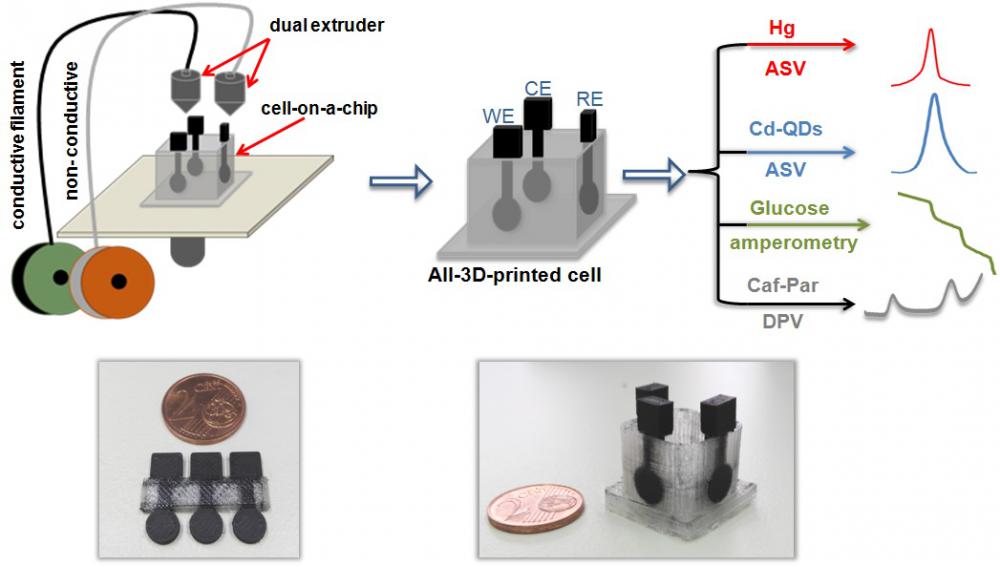A 3D printing process is used for the fabrication of electrochemical cell-on-a-chip devices, which are applied to voltammetric sensing of pharmaceuticals, heavy metals and enzymatic biosensing. The devices are entirely printed via a single-step process using a dual extruder 3D printer and are composed of vessels/holders/parts (printed from non-conductive filaments) and of integrated thermoplastic electrodes (printed from conductive filaments).

Representative publications:
8) "3D Printed Bioelectronic Microwells", Advanced Functional Materials, 2021, DOI: https://doi.org/10.1002/adfm.202102459
7) "Smartphone-Addressable 3D-Printed Electrochemical Ring for Nonenzymatic Self-Monitoring of Glucose in Human Sweat" Analytical Chemistry, 2021, 93, 7, 3331–3336
6) " 3D printed microcell featuring a disposable nanocomposite Sb/Sn immunosensor for quantum dot-based electrochemical determination of adulteration of ewe/goat’s cheese with cow’s milk" Sensors and Actuators B, 334 (2021) 129614
5) " Voltammetric Determination of Pb(II) by a Ca-MOF-Modified Carbon Paste Electrode Integrated in a 3D-Printed Device", Sensors 2020, 20(16), 4442
4) " 3D-printed lab-in-a-syringe voltammetric cell based on a working electrode modified with a highly efficient Ca-MOF sorbent for the determination of Hg (II)" Sensors and Actuators B, 321 (2020) 128508
3) "Miniature 3D-printed integrated electrochemical cell for trace voltammetric Hg(II) determination" , Sensors and Actuators B, 308 (2020) 127715
2) "A novel all-3D-printed cell-on-a-chip device as a useful electroanalytical tool: Application to the simultaneous voltammetric determination of caffeine and paracetamol", Talanta 208 (2020) 120388
1) “Single-step fabrication of an integrated 3D-printed device for electrochemical sensing applications“ Electrochemistry Communications, 103 (2019) 100–103

Representative publications:
8) "3D Printed Bioelectronic Microwells", Advanced Functional Materials, 2021, DOI: https://doi.org/10.1002/adfm.202102459
7) "Smartphone-Addressable 3D-Printed Electrochemical Ring for Nonenzymatic Self-Monitoring of Glucose in Human Sweat" Analytical Chemistry, 2021, 93, 7, 3331–3336
6) " 3D printed microcell featuring a disposable nanocomposite Sb/Sn immunosensor for quantum dot-based electrochemical determination of adulteration of ewe/goat’s cheese with cow’s milk" Sensors and Actuators B, 334 (2021) 129614
5) " Voltammetric Determination of Pb(II) by a Ca-MOF-Modified Carbon Paste Electrode Integrated in a 3D-Printed Device", Sensors 2020, 20(16), 4442
4) " 3D-printed lab-in-a-syringe voltammetric cell based on a working electrode modified with a highly efficient Ca-MOF sorbent for the determination of Hg (II)" Sensors and Actuators B, 321 (2020) 128508
3) "Miniature 3D-printed integrated electrochemical cell for trace voltammetric Hg(II) determination" , Sensors and Actuators B, 308 (2020) 127715
2) "A novel all-3D-printed cell-on-a-chip device as a useful electroanalytical tool: Application to the simultaneous voltammetric determination of caffeine and paracetamol", Talanta 208 (2020) 120388
1) “Single-step fabrication of an integrated 3D-printed device for electrochemical sensing applications“ Electrochemistry Communications, 103 (2019) 100–103

